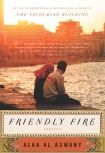Friendly Fire by Alaa Aswany (best e book reader TXT) 📗

- Author: Alaa Aswany
Book online «Friendly Fire by Alaa Aswany (best e book reader TXT) 📗». Author Alaa Aswany
7
I returned one day from the department to find my mother silent and anxious.
When I questioned her closely, she cried and said that she was afraid but wouldn’t elaborate. Huda made a sign to me behind her back and took me aside in the kitchen and informed me that my mother was afraid because she had a lump in her chest. The swelling had appeared several months earlier but she’d decided to tell no one and had tried to treat it on her own. She’d tried everything. She’d rubbed her chest with dough, she’d put a poultice on it, and she’d dressed it with water and sugar. She’d even taken birth-control pills, on the advice of a woman living nearby, and in the end, when these methods had failed, my mother had decided to ignore the swelling—to talk, laugh, get mad, and live as though it didn’t exist. A faint hope told her that she would wake up one morning and discover that the swelling had disappeared as suddenly as it had come. In vain, however. The swelling had come precisely to stay, invade, and spread, and when it reached her neck and this puffed up and became covered with blue lines, it became impossible to hide or ignore it.
In the evening, the doctor’s clinic was crowded with patients and their families. I could distinguish the sick from their relatives at one glance, not just from their pallor and fatigue but from their eyes, which had an absent look and seemed to be covered by a cloud, as though, when they looked in your direction, they saw something behind you—something obscure that only became visible a little before death.
The doctor was a professor of oncology and at the same time a brigadier general in the armed forces and religious (in the middle of his forehead there was a black mark caused by his prostrating himself and touching his head to the ground in prayer, while over his head on the wall was the Throne Verse done in beautiful gilded script). After examining my mother carefully, he went back to his desk and opened the conversation with the words “In the name of God the Merciful, the Compassionate.” Then, bowing his head so that his eyes shouldn’t meet hers, he said to my mother, “Hagga, you are a believer in God, and the Almighty has said in his Noble Book, Naught shall visit us but what God has prescribed for us (God has spoken the truth). I am sorry to have to tell you that you are afflicted with widespread malignant tumors. We call this type ‘fourth-degree’ and, unfortunately, they cannot be removed surgically. We place great hope in chemotherapy and yet greater hope in God, Almighty and Glorious.”
In college, my professors used to conduct their experiments on rats, after first killing them. When the rat’s turn came and the professor’s huge hand, enclosed in its white glove, stretched down into the cage to grab it, it would try desperately to escape from his grip; and when it finally failed and the hand got a good grip on it and brought it out of the cage to kill it, the rat would let out an intermittent screech and spontaneously void its bowels. My mother screamed in the doctor’s clinic and beat her cheeks and threw herself on the floor and the doctor and I only succeeded in calming her after some effort. He wrote out a list of tests and medications and I went home with her in a taxi. I didn’t speak on the way back but gathered from a flash of light on her face in the darkness and from a sob that escaped her that she was crying. As soon as we reached the house, my mother phoned her brother Abbas; as she told him an expression of anguish sketched itself on her face that never again left her.
Months of treatment went by. My mother’s body grew emaciated, her breasts were altogether destroyed, her skin darkened, and her hair fell out, but the anguish never left her





Comments (0)